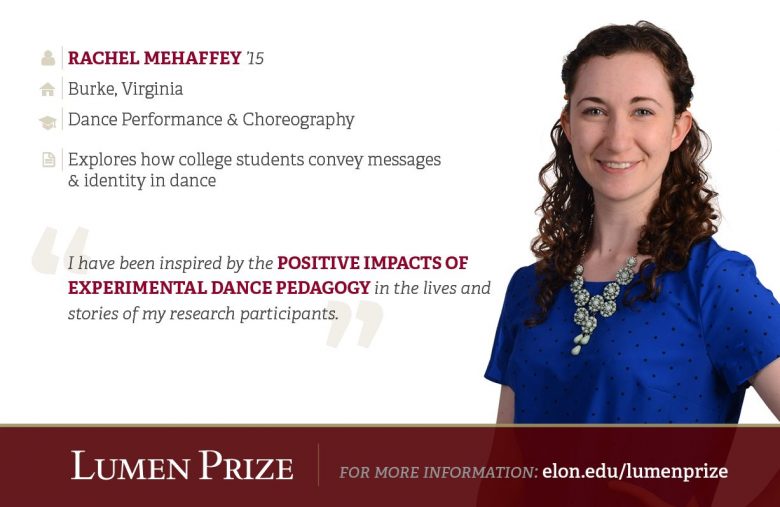Elon University senior Rachel Mehaffey used the university's top prize for undergraduate research and creative achievements to study the way dancers interpret what they are asked to perform on stage and in the classroom.

By Sarah Mulnick ’17
A dancer on stage isn’t alone—others are involved in what’s expressed, from choreographers to the audience. Amid that group, how does the dancer shape her own actions?
Elon University senior Rachel Mehaffey set out to answer that question after a college writing class sparked her interest in dance scholarship and how it fit into her own experience.
The dance performance and choreography major soon began researching the interplay between dance students and agency, and her work is the latest to be featured in a series of E-net profiles on Lumen Scholars in the Class of 2015.
Mehaffey looked at dancers as “rhetors,” agents who crafted their own language and made choices about the text they were creating. Previous scholarship was written from the perspective of the audience or scholars rather than the dancers, which made what she was studying a new field.
“They’re sharing power with a lot of other people,” she said of dancers. “When dancers talk about how they impact the situation, they’ll talk about how they did it in concert with others. As a dancer, you are engaged in a physical sort of dialogue.”
Mehaffey said dancers often lack a forum where they can discuss their experiences, especially at the university level. In a career where individuals have to put themselves forward to progress, she added, that’s something to address.
The Honors Fellow conducted a yearlong case study that used dance labs and interviews to understand the way dancers interpreted the ways they were asked to move.
Mehaffey concentrated on how dancers viewed their own lived experiences to better understand what dancers see as their own agency, which she defines as the capacity to shape and be shaped by the situation unfolding around them.
What she found was that they saw themselves as working closely with others. “It’s this reciprocal process,” she said. “It involves decision making, short-term and long-term goals and questioning.”
In the focus groups, dancers explained how they had felt and why they’d responded as they had to prompts Mehaffey gave.
“Dancers tend to define who they are as dancers by the genre of dance that they do at first,” she said. “Over time they talk more about the lived experience of their body.”
When dance students talk about their experiences, Mehaffey continued, they understand themselves as the active agents and also give that control to the people around them.

The Lumen Prize, awarded for the first time in 2008, provides selected students with a $15,000 scholarship to support and celebrate their academic and creative achievements. Lumen Scholars work closely with faculty mentors to pursue and complete their projects.
Efforts include coursework, study abroad, research both on campus and abroad as well as during the regular academic year and summers, internships locally and abroad, program development and creative productions and performances.
The name for the Lumen prize comes from Elon’s historic motto “Numen Lumen,” Latin words for “spiritual light” and “intellectual light.”
Associate Professor Lauren Kearns mentored Mehaffey and said that in many ways, working with her was like working with a colleague.
“I jokingly say to my colleagues that I feel someday she will run the dance universe,” Kearns said. “I see her becoming a leader in the dance world and I fully expect to see her as a colleague at some point in the future.”
She added that her high expectations for Mehaffey come from the skill she’s exhibited at everything she’s done. “She’s a gifted performer, and a gifted choreographer,” Kearns said. “I see her continuing her dance theory research and then going back to graduate school, because her thesis now is really at a graduate level.”
Mehaffey was initially drawn to Elon’s open community and the potentials for undergraduate research. The Virginia native has been a teaching and research assistant at Elon, and she earned her certification to teach Pilates. She was also the secretary of Sierra Club and worked on the committee examining the intellectual climate at Elon.
Upon graduation, Mehaffey will be living in Raleigh for a year to begin a career in dance performance and choreography. She will also be working to publish this research, which she hopes will be a stepping stone to open the dialogue about what personal agency means for dancers who have to follow a set choreography for a performance.
“Dance is definitely in my future,” she said. “I want to nurture both dimensions of myself, the artist and the scholar side, and find ways in which those intersect and inform each other.”


